Google vs Microsoft vs Apple vs Facebook vs RIM – The Constantly Evolving IT Landscape
Russian economist Nikolai Kondratiev was the first to observe major reoccurring supercycles in Western capitalism. The main idea behind his theory is that every 50-60 years the economy goes through a series of phases in a certain technology: prosperity, recession, depression, and finally improvement. The lasting output from the supercycle is often companies and the infrastructure we use in our everyday lives. Think of railways. The railways we use are essentially from a hundred years ago. There are no ambitious plans to expand the current railway network in North America, just maintain it. The same goes for refineries, roads, and to a certain extent the power system.
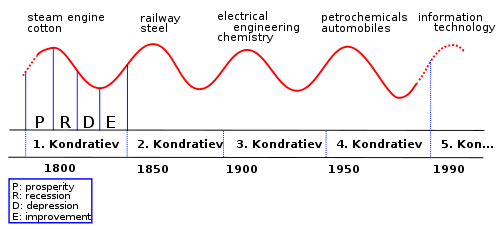
We are currently in the midst of an information technology wave that has been growing since the 1970’s, but this K-wave has been far from a continuous rise. Within the superwave there have been a series of smaller expansions and contractions. In each wave a market behemoth emerges, but has always failed to jump to the next emerging wave in the IT industry. This is Microsoft failing to have the dominating presence Google has in search. Nokia failing to be as popular with smartphones as it was with cellphones. Google failing to make a foray into social networks with Buzz and Orkut. The future of computing lies in the confluence of social and mobile, and Google is trying to do what all previous technology companies have failed to do: make the transition to the next wave.
History of the IT sector
Take a quick look at the evolution of the IT sector:
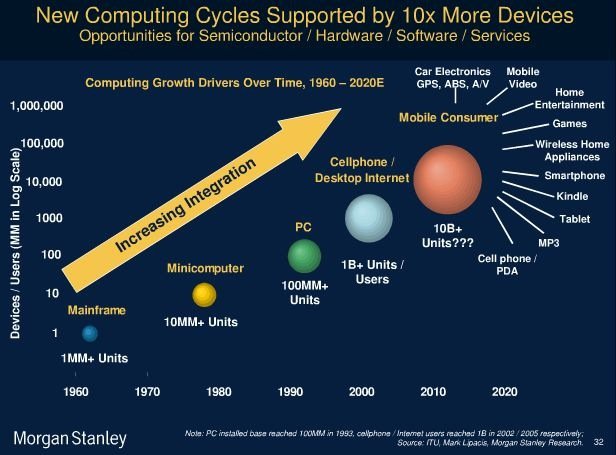
- IBM dominated mainframes
- Microsoft dominated desktops (under threat from mobile computing)
- Google dominated Internet (its Ad dollars under threat from social networks)
- Apple is dominating mobile computing (iPod, iPhone, iPad, Macbook)
- Facebook is dominating social networks
The firms listed above all display monopolistic behaviour in its home territory and the numbers speak for themselves. 90% of mainframes are sold by IBM. 90% of desktops have Windows as an OS. 75% of searches are performed by Google (they are as high as 90% in some countries). Facebook has 900 million users, while the next largest social network is Twitter with an estimated 200 million users.
The success of these companies have created platforms that locks users to a certain experience. What are these platforms? Windows is the platform for PC applications. Meaning if you want to develop an application for a PC it is likely to be Windows, not Linux. Google is the platform for Internet search and online advertising. Facebook is the platform for social interaction on the web. Apple’s iOS is the platform for mobile applications. These IT platforms are the equivalent to physical infrastructure like highways, transmission towers, and railways. It’s possible to construct another transcontinental railway, just like how Microsoft can put its resources into Bing, but everyone is already using an existing railway that works quite well, Google. Constructing a new railway only makes sense to serve niche markets, much like Wolfram Alpha.
Autocatalysis is a large part why these platforms get locked in. Autocatalysis is when a product fuels a reaction. You get Facebook because all your friends have Facebook. Your friend got Facebook because all of his friends have Facebook, etc. The same phenomena occurred with Windows, and to an extent is occurring with mobile applications on iOS. There is often a gestation period when competing platforms exist, but at a glance it appears that IT has a tendency of developing platform monopolies. At the moment mobile platforms like Android, iOS and BB may be an anomaly to this rule.
IT Battle Fronts
Sitting at the steps of the US Custom House in New York City are Daniel Chester’s Four Continents. These sculptures are bursting with symbolism describing the stereotypical view of the world at the turn of the last century, especially relating to how the French viewed the Continents role in the world:
 |
|

| 
|
| Africa, barely robed, her eyes closed, still sleeps next to the Sphinx | Asia is impassive with eyes cast downward, her people bent in bondage, kneeling and giving obeisance. |

|

|
| Europe wears a crown and sits unperturbed, clothed in robes of regal status quo, holding her hands symbols of office | America is the most active of the four figures, and appears ready to rise from her seat. |
I couldn’t help but notice the metaphor I saw in the technology industry. The IT sector has several battlefronts as companies compete in various Red and Blue Oceans. Some battlefronts have a company playing the role of the incumbent (Europe), while other battlefronts have the same company playing the challenger (America).
Here is a list of some of these competing fronts:
- RIM’s Blackberry vs Apple’s iPhone vs Google’s Android
- Facebook vs Twitter vs LinkedIn vs Google+
- Google’s Adwords vs Facebook Ads vs Groupon
- Microsoft’s Windows vs Google’s Chrome vs Apple’s App Store
- Microsoft’s Office vs Apple’s iWork vs Google Docs
Note that Google is involved in each of these IT Battlefronts. A dangerous position to be if history is any indication. Back in WWII Hitler’s Germany was involved in a multi-front war against the World, and things didn’t turn out so well. It’s important to choose your battles wisely, and luckily Google’s Larry Page has begun to do just that after replacing Eric Schmidt. Months before passing away, Steve Jobs advised Page to focus on doing extremely well on fewer products, rather than trying to do everything under the sun.

Mobile Platforms
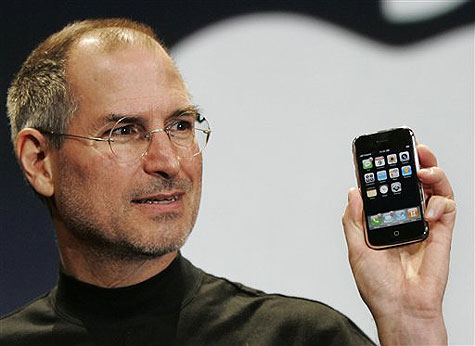
The Incumbent:
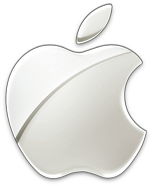
The Challenger:
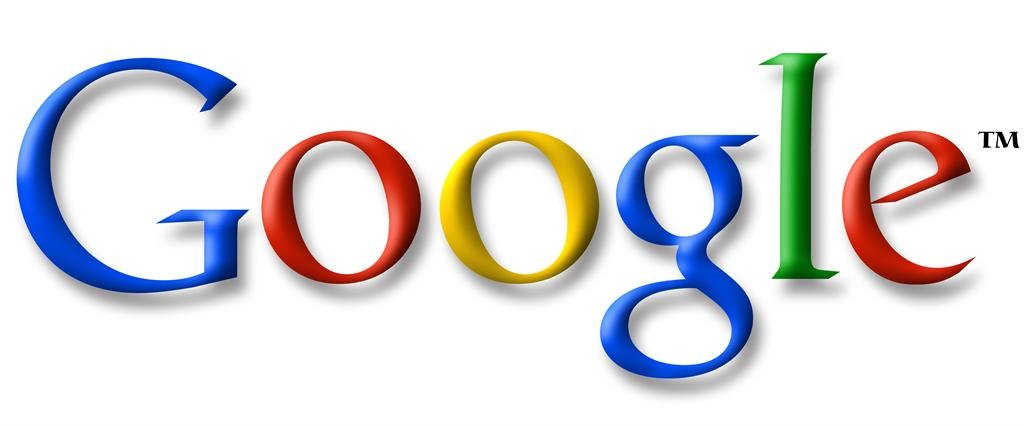
The Past Incumbent:

The Lost Cause:

The Mobile Platform is probably the most significant IT battlefront being fought right now. Every week there are new patent lawsuits between Samsung and Apple. Patent trolls trying to make billions. There is room for dispute in this area, but here are my views:
Apple is the leader in the mobile space. It leads the industry in hardware design, has the largest app store, the sleekest OS, and the most active smartphone users when it comes to data and app usage. Google is Apple’s only serious competition at the moment. It may have the largest market share of smartphones being sold right now, but its users are not as ardent as iPhone users. RIM and Nokia are the past leaders in the mobile arena, and are dormant when you compare them to Apple or Google. Both companies are growing in developing countries like India and Brazil, but they are falling behind in North America.
Social Networks
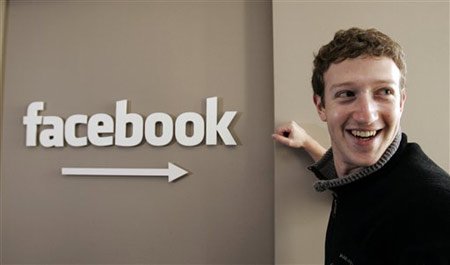
The Incumbent:

The Challenger:

The Past Incumbent:

Social networks can be thought of as a social layer that gives depth to web. In several ways Facebook is like your Passport to the Web – a place where you can maintain your online identity.
You describe who you are, post your interests, like various artists and consumer products, share pictures of places you have visited. There are other social networks that are widely used, like LinkedIn and Twitter, but these serve as niche markets. Google is not a newcomer to social networks. It’s Orkut is popular in India and Brazil, but never managed to gain traction worldwide. Google Buzz was its first organized attempt at spearheading its way into social networks, but it failed. Google+ is its latest attempt that seems to have some traction. If Google+ is going to succeed in any scenario, Google has to leverage the widespread use of Android on mobile phones.
Advertisement
The Incumbent:

The Challenger:

Google’s Adwords is the 800 pound gorilla in the room in online advertising. In the traditional advertising market, a company like BMW would buy some screen time in a movie theatre, play the advertisement to a general audience, and hope that someone in the room is planning on buying a new car in the near future. Google changed this strategy by allowing buyers find sellers via search, and targeted content-related ads. A specific user searches for new cars in a city, and BMW can pay to show targeted ads to him. Google has the largest market share in online advertisement but has some competition with Facebook and Groupon.
Users are spending more time on Facebook than Google, allowing it to divert ad dollars to its pockets (its market share is still tiny in comparison to Google’s). Facebook has potential to change advertisement in a similar way Google did in the past. Ads can be targeted based on your demographics and interests. Or maybe you are willing to try a new product when you see a lot of your friends posting about it on their profiles.
On the other hand there is Groupon and a slew of other daily deal companies that offer hyper local pseudo-advertising. In this advertising model users signup for daily deals with massive discounts. Google has begun offering a similar product, and has bundled it into the Google Shopper App.
Operating System
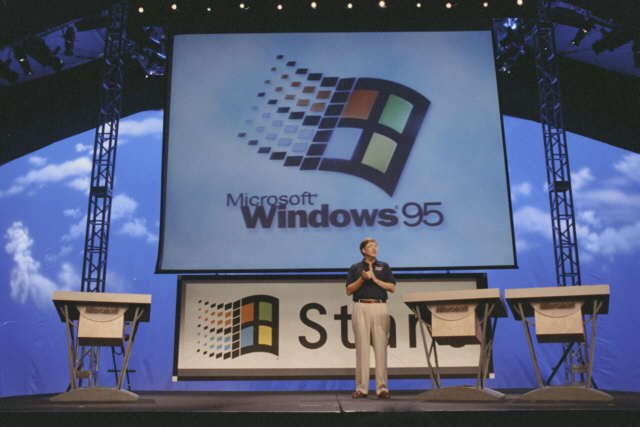
The Incumbent:

The Challenger: Mobile Platforms

Windows and OS X are less relevant today compared to the past when you look at how most people use their computers. In a sense the traditional OS exists to allow people to use the de facto modern OS: the web browser. Google has released its take on the modern OS with Chromebook. Personally I think it is a product well suited for technology geeks, not your average computer user.
Office Productivity Tools
The Incumbent:

The Challenger:


The dominant office productivity suite is Microsoft Office. Applications like Word and Excel are stored in offline media. The Blue Ocean Strategy: online and collaborative office productivity applications. Documents are accessible to any device connecting to the cloud. There are several of these available in the web: Google Docs, Apple has recently released iWork. Microsoft also has its own Live Office.
Final thoughts
In 1999 few could imagine how Microsoft could ever become less relevant in the IT sector. The answer is now clear: You can never beat Microsoft at a game it plays best – Windows and Office on the PC (Red Ocean). Instead, you find a new game that Microsoft doesn’t know how to play, or better yet, doesn’t care to play at the moment (Blue Ocean).
Once Google became dominant in online search, it began to seek other markets to profit from. It has always had its eye on Microsoft Windows and Office, but as the company grew older it expanded its focus and now competes with Facebook, Amazon, Apple, RIM, and Groupon in varying degrees.
Nobody, including Google, knows where exactly technology will be in 5-10 years, but Google is implementing a strategy to secure its position in the next technology subwave. It’s tactics are borrowed from Greek history: the Trojan Horse. Google distributes Android for free to hardware manufacturers (although most of them now pay fees to license Microsoft’s patents). Google is the gateway to the Internet on the desktop, but the mobile gateway is still a blue ocean. By creating a mobile platform, it seeks to control the user experience in the mobile transition.
***By no means am I an Anti-Googler. It’s quite the opposite, I admire and root for the company.









Leave your response!